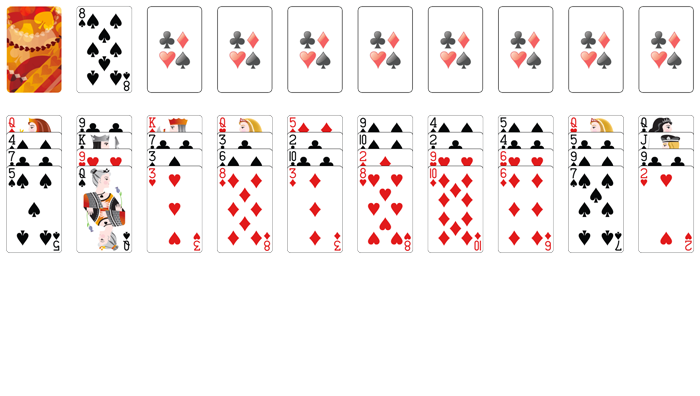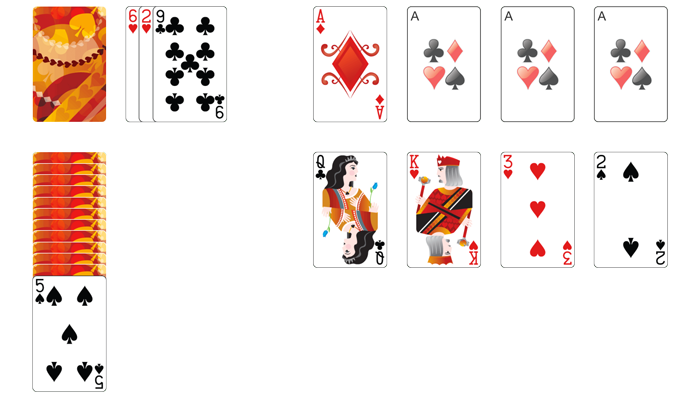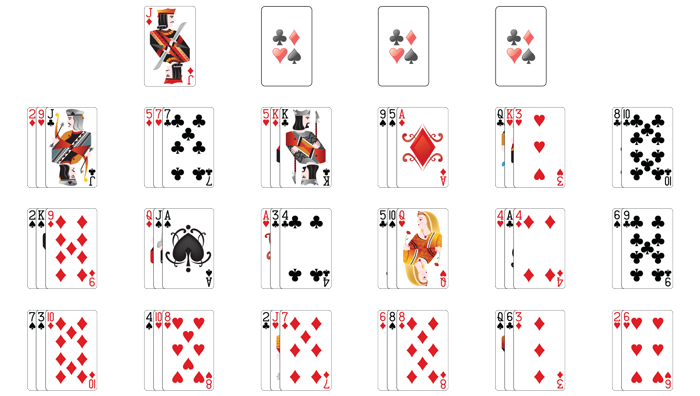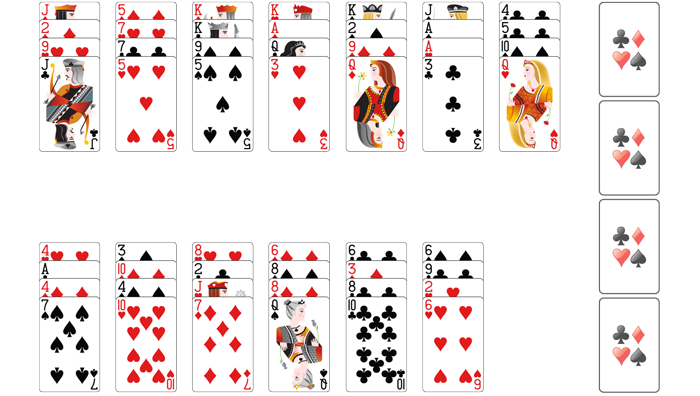Forty thieves is a solitaire game for those who like challenges and have plenty of time. It is necessary to count on luck in the distribution of cards and have the ability to move all the cards to the foundations.
Move all the cards, in ascending order by suit, to the eight foundations.
The game is difficult for two very simple reasons:
Since you cannot move groups of cards, your mission to arrange the cards into piles is not the easiest one. And since the game has two decks, you need to organize 8 suits to win.
But to arrange these suits you will need more than just skill: it takes luck. Lucky that the cards in the piles are favorably arranged (lower cards on top and higher at the bottom) and lucky that the stock cards are also favorably distributed (aces appearing early on, for example).
The reference to "forty" (in the name of the game) derives from the 10 piles of 4 cards each, giving a total of 40 cards at the start of the game. This game is also known by other names such as Big Forty, Le Cadran, Napoleon at Saint Helena and Roosevelt at San Juan in>.
There are many variations of Forty Thieves. Several of them were created to facilitate the game. Among these variations we can find one in which all Aces start from the foundations. In another, the cards in the piles can be arranged in descending order and with alternating colors. While in another, Josephine Solitaire, the cards in the piles can be moved in groups if they are sorted and are of the same suit.

Game with pretty much the same rules as Forty Thieves Solitaire, just a little easier.

Canfield Solitaire is a difficult game with low chances to win (turn three variation).

Bear River Solitaire is a unique solitaire game that requires a lot of thinking to complete.

A game with many chances to win and that requires more skill than luck.
Solitaire, a game often seen as a simple diversion, holds within its ordered world a profound lesson in mindfulness and the art of delayed gratification. The solitary nature of the game encourages a player to be fully present in the moment, focusing on the cards, the possible moves, and the strategies to be employed. This singular concentration fosters a state of mindfulness, where external distractions fade away, allowing the player to engage in a form of active meditation. The rhythmic pattern of sorting and organizing the cards becomes a practice in patience and attentiveness, as one must remain aware of the present game state while also anticipating future moves. In this way, Solitaire trains the mind to be observant and deliberate, qualities that are essential for mindfulness.
Furthermore, Solitaire is not a game of instant rewards; it teaches players the value of delayed gratification. Unlike fast-paced games that offer immediate rewards and constant stimulation, Solitaire requires a player to work through the deck patiently, with the understanding that success may not be immediate. This pacing ensures that when victory comes, it is the result of persistence and the ability to delay the desire for an immediate outcome. In a world that often prioritizes instant gratification, Solitaire stands out as a bastion for the slower, more rewarding experience. It instills in players the understanding that some rewards are worth the wait, and that the satisfaction derived from achieving a goal is heightened by the effort and time invested in reaching it.
Solitaire, a game often associated with leisurely pastime, has found its place as a cogent tool in the arsenal for promoting elderly brain health. As individuals age, the importance of maintaining cognitive agility becomes paramount, and Solitaire offers a readily accessible means to engage the brain in a range of mental exercises. The game's requirement for pattern recognition, strategic planning, and memory recall exercises key areas of the brain involved in cognitive preservation. Regular engagement in Solitaire can help older adults keep their minds sharp, potentially staving off the cognitive decline that can accompany aging. It's not just about moving cards, but rather about stimulating neural pathways, enhancing mental speed, and preserving the brain's plasticity, which are crucial for sustaining a high quality of cognitive function in the later years of life.
Moreover, Solitaire's inherent flexibility as a game that can be played both traditionally with cards or digitally on various devices adds to its appeal for the elderly, offering a comfortable and familiar interface to engage with technology. This intersection of traditional game mechanics with modern technology not only bridges generational gaps but also encourages a form of mental training that is both effective and enjoyable. The simplicity of Solitaire, requiring no complex rules or physical exertion, makes it an ideal brain exercise for the elderly, providing a gentle yet effective workout for the mind. By regularly arranging decks, sequencing suits, and solving layouts, elderly players can sharpen their mental faculties, potentially enhancing their daily functioning and prolonging their cognitive health.